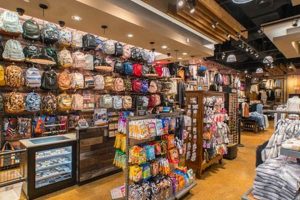An establishment providing skateboarding equipment and apparel, the business serves as a retail outlet for decks, trucks, wheels, bearings, and protective gear, among other items. Such a business caters to both novice and experienced skateboarders. For example, individuals starting the sport may visit to acquire their first board, while seasoned riders seek replacement parts or upgraded equipment.
These specialty retailers are important community hubs, fostering a sense of belonging among skateboarding enthusiasts. They often host events, offer workshops, and provide a space for riders to connect. Historically, these shops played a key role in the development of skateboarding culture, influencing trends and supporting local talent. Their existence allows for specialized product knowledge and customer service absent from larger sporting goods stores.
The following article will delve into aspects such as product selection, customer service approaches, community engagement strategies, and the impact of such establishments on the local skateboarding scene. Further discussion will encompass online presence, marketing techniques, and the challenges and opportunities facing this sector of the retail market.
Skateboarding Equipment Selection and Maintenance
Optimal skateboarding performance and safety necessitate careful attention to equipment selection and ongoing maintenance. The following guidelines provide insights applicable across skill levels.
Tip 1: Deck Assessment: Regularly inspect the skateboard deck for cracks, warping, or delamination. These conditions compromise structural integrity and rider safety. Replacement is advised upon detection.
Tip 2: Truck Tightness Verification: Ensure truck kingpins are appropriately tightened. Over-tightening restricts turning ability, while insufficient tightness induces instability. Use a skate tool to adjust accordingly.
Tip 3: Wheel Bearing Maintenance: Periodically clean and lubricate wheel bearings. Dirt and debris impede rolling efficiency. Applying bearing lubricant extends the lifespan of the bearing.
Tip 4: Wheel Wear Inspection: Monitor wheel wear patterns. Uneven wear affects board control. Rotate wheels regularly to promote even degradation. Replace wheels when worn to a diameter that significantly impacts performance.
Tip 5: Grip Tape Condition: Maintain a clean and abrasive grip tape surface. Dirt accumulation reduces traction. Use a grip tape cleaner to restore grip. Replace grip tape when its effectiveness diminishes.
Tip 6: Hardware Security: Routinely check the tightness of all nuts and bolts. Vibration loosens hardware over time. Tightening hardware prevents component separation during use.
Tip 7: Protective Gear Usage: Always utilize appropriate protective gear, including a helmet, knee pads, and elbow pads. These items mitigate injury risk during falls. Ensure proper fit and secure fastening.
Adhering to these guidelines promotes safer skateboarding practices, enhances equipment longevity, and optimizes overall riding experience.
The subsequent sections will elaborate on specialized gear selection and customization options.
1. Equipment Variety
Equipment variety is a cornerstone of a successful skateboarding retail operation. A diverse inventory caters to a broad spectrum of skateboarding styles, skill levels, and budgetary constraints. The absence of such variety limits the retailer’s appeal, potentially driving customers to competitors with more comprehensive offerings. For instance, a skater searching for a specific deck size or truck width will likely patronize a store stocking numerous options, as opposed to one with a limited selection. This, in turn, directly impacts sales revenue and customer loyalty.
The correlation between equipment variety and the success of skateboarding shops is further evidenced by examining established retailers. Shops that curate their inventory to reflect current trends, while also maintaining a selection of classic equipment, tend to cultivate a loyal customer base. For example, a store may stock both the latest pro model decks alongside traditional shaped boards, satisfying both experienced and nostalgic skaters. Providing a wide range of wheel durometers, bearing types, and hardware options allows skaters to fine-tune their setups for specific terrains and riding styles. This level of customization is a critical factor influencing purchasing decisions.
Ultimately, the principle of offering equipment variety extends beyond mere product quantity. It encompasses a commitment to providing skaters with the necessary tools to express their individual styles and progress in their skateboarding pursuits. Neglecting this aspect diminishes the retailer’s value proposition and hinders its ability to thrive in a competitive market. A shop specializing in a wider variety ensures more reach of potential customers.
2. Expert Guidance
Expert guidance is a critical component in the value proposition of a specialized skateboarding retailer. The provision of knowledgeable advice differentiates these establishments from generalized sporting goods stores and online retailers. Skateboarding equipment selection is often nuanced, demanding a comprehensive understanding of component compatibility, performance characteristics, and individual skater needs. Untrained personnel are ill-equipped to provide accurate recommendations, potentially leading to customer dissatisfaction and, in some cases, unsafe equipment configurations. For instance, incorrectly sized trucks can negatively impact turning radius and board stability, while incompatible bearing spacers can damage bearings and hinder performance.
The importance of expert guidance manifests in multiple practical applications. Skateboarders often seek advice on assembling custom setups tailored to their specific riding styles and preferences. A knowledgeable staff member can assist in selecting complementary components, ensuring optimal performance and durability. Furthermore, experienced skaters may require assistance in diagnosing and resolving equipment-related issues. An employee possessing technical expertise can provide troubleshooting guidance, potentially saving the customer time and money on unnecessary repairs or replacements. Consider a scenario where a skater experiences wheel slippage. An expert could diagnose the issue as worn bearings, recommending a bearing replacement and cleaning, thereby improving performance and preventing further damage. A final area of consideration in expert guidance is safety gear. A quality skate shop will be able to give expert advice on appropriate fitting for helmets and pads, and advise on the correct use for specific types of skating.
In conclusion, expert guidance serves as a foundational element in the success of a skateboarding retail business. It fosters customer trust, promotes informed purchasing decisions, and contributes to a safer skateboarding environment. The absence of competent and readily available advice diminishes the retailer’s competitive advantage and undermines its ability to cultivate a loyal customer base. As such, the cultivation of product knowledge and technical expertise among staff members represents a strategic imperative for any serious skateboarding retailer. The key is to balance expert advice with the skateboarders personal experience and style of skating.
3. Community Hub
A skateboarding retailer, serving as a community hub, provides more than just a point of sale for equipment. The establishment functions as a gathering place, fostering interaction and shared experience among skateboarding enthusiasts. This connection is not incidental; the creation and maintenance of a community hub directly impacts the retailer’s longevity and cultural significance. For example, the hosting of skateboarding events, such as demonstrations, competitions, or workshops, draws skaters of all skill levels, effectively creating a space for networking, skill development, and shared passion. This, in turn, generates increased foot traffic and brand loyalty for the retailer.
The absence of a community-centric approach often results in the marginalization of the retailer within the local skateboarding scene. Stores that solely prioritize sales transactions without investing in community engagement risk being perceived as detached and impersonal. By contrast, retailers that actively support local skateboarding initiatives, such as sponsoring skaters, contributing to skate park maintenance, or partnering with local schools, cultivate a positive image and foster a sense of belonging. An illustrative example can be found in retailers offering beginner lessons or mentorship programs, integrating novices into the skateboarding community and creating lifelong customers. Furthermore, a physical space for skateboarders to congregate, share experiences and ideas increases the likelihood of a successful store.
The recognition and deliberate cultivation of a community hub are therefore crucial for a skateboarding retailer’s long-term viability. This approach necessitates a shift in focus beyond immediate profits, towards building relationships and fostering a sense of shared identity. The creation of a welcoming and supportive environment, achieved through events, sponsorships, and genuine engagement, translates into sustained customer loyalty, positive word-of-mouth referrals, and the retailer’s enduring presence within the local skateboarding culture. This also aids in growing the sport of skateboarding itself.
4. Customization Options
The provision of customization options within a skateboarding retail environment is fundamentally linked to meeting the diverse needs and preferences of the clientele. Skateboarders, owing to varying riding styles, skill levels, and anatomical differences, often require equipment configurations tailored to their individual requirements. This demand creates a market for specialized components and assembly services, effectively establishing customization as a significant value proposition for a skateboarding retailer. The availability of a broad selection of decks, trucks, wheels, bearings, and hardware, each with unique performance characteristics, allows riders to fine-tune their setups for optimal control, comfort, and performance. The absence of such options necessitates compromising on equipment suitability, potentially hindering skill progression and increasing the risk of injury. Consider a skater specializing in vert riding: a wider deck and harder wheels are preferable to that of a technical street skater with a narrow deck and softer wheels. Customization allows a skateboarder to truly tailor their skating style.
The economic impact of customization options on a skateboarding shop’s performance is also notable. Retailers offering assembly services, component upgrades, and personalized consultations often command a premium pricing structure, reflecting the added value of expertise and specialized knowledge. This differentiation strategy allows for higher profit margins compared to simply selling pre-assembled skateboards. Furthermore, customization drives repeat business as skaters routinely seek to upgrade or modify their setups in response to changing skill levels or evolving riding styles. A shop that caters to this need can become an invaluable resource for the skating community, and thus a location of regular customer visits and interaction. A shop specializing in rare and unusual components also fosters a stronger community, as there is a value to acquiring and discussing this equipment.
In summary, the offering of customization options serves as a crucial differentiator for any skateboarding retailer seeking to establish a competitive advantage. It directly caters to the individualized needs of skateboarders, generates increased revenue through premium pricing and repeat business, and fosters a stronger sense of community within the local skateboarding scene. The successful implementation of a comprehensive customization program necessitates a deep understanding of skateboarding equipment, a commitment to providing expert guidance, and a willingness to adapt to the ever-evolving demands of the skateboarding market. Successful implementation of a custom skate shop benefits both the skateboarders and the owner of the shop.
5. Local Support
Sustained viability of a specialized skateboarding retailer often depends significantly on its demonstrated commitment to local support. This element transcends mere transactional interactions, instead fostering a symbiotic relationship between the business and its surrounding skateboarding community.
- Sponsorship of Local Skaters
Direct financial or material support for local skaters, whether amateur or aspiring professionals, provides tangible resources for skill development and competitive participation. The skateboarding retailer’s logo prominently displayed on skater equipment or apparel creates brand visibility and associates the business with positive athletic endeavors. This facilitates organic marketing through skater performance and community engagement, establishing a positive brand association within the local scene.
- Support for Local Skate Parks
Contributing to the maintenance, renovation, or construction of local skate parks demonstrates a commitment to providing safe and accessible skateboarding infrastructure. This can take the form of financial donations, volunteer labor, or in-kind contributions of materials. Involvement with skate park projects generates goodwill within the community, solidifies the retailer’s reputation as a supporter of skateboarding, and provides a physical space for skaters to congregate, promoting both skill development and social interaction.
- Hosting Community Events and Workshops
Organizing skateboarding-related events, such as competitions, demonstrations, workshops, or film screenings, cultivates a sense of community and provides opportunities for skill sharing and social interaction. Such events draw skaters of all skill levels, boosting foot traffic to the retailer’s location and creating opportunities for product promotion and sales. Furthermore, hosting events establishes the retailer as a central hub for skateboarding culture within the local area.
- Collaborations with Local Artists and Businesses
Partnering with local artists to design custom merchandise, decks, or apparel fosters creativity and individuality within the skateboarding community. Collaborating with other local businesses, such as restaurants or coffee shops, cross-promotes products and services, expanding the retailer’s customer base and strengthening ties within the local economy. Such collaborations demonstrate a commitment to supporting the broader community and contribute to a vibrant local culture.
These interconnected facets underscore the integral role of local support in the success of a specialized skateboarding retailer. By investing in the local skateboarding community, a business not only enhances its own visibility and reputation but also contributes to the overall health and vibrancy of the skateboarding scene. The result is a sustainable ecosystem where both the retailer and the community thrive in a mutually beneficial relationship. This is a crucial part of a successful skate shop.
6. Brand Selection
Brand selection constitutes a pivotal element in the operational success and overall reputation of a skateboarding retail establishment. The range of brands offered significantly influences customer perception, shaping the store’s identity and attracting specific segments within the skateboarding community. A deliberate brand strategy, aligned with the retailer’s target market and core values, dictates product offerings, pricing structures, and marketing approaches. For instance, a shop prioritizing high-performance equipment may stock premium brands known for innovative technology and durable construction. Conversely, a retailer catering to budget-conscious skaters may emphasize value-oriented brands offering affordable alternatives. This selection significantly impacts consumer decisions.
The importance of brand selection extends beyond mere product diversification. It reflects the retailer’s understanding of current skateboarding trends, technical advancements, and the evolving preferences of its customer base. Stocking established brands with proven track records ensures product reliability and customer satisfaction. Simultaneously, introducing emerging brands allows the retailer to stay ahead of the curve, catering to early adopters and fostering a perception of innovation. Consider the inclusion of a brand known for its eco-friendly production practices; this aligns the retailer with environmentally conscious consumers. Therefore, a strategic brand selection contributes to attracting a more diverse clientele.
Effective brand selection is neither static nor arbitrary; it requires continuous monitoring of market trends, competitor offerings, and customer feedback. A skateboarding retail establishment must adapt its brand portfolio to remain relevant and competitive. Failure to curate a compelling brand selection can lead to customer attrition, reduced sales, and a diminished market presence. Thus, brand selection must reflect an understanding of the target consumer, while adapting to the trends in skateboarding.
Frequently Asked Questions
The following addresses common inquiries regarding the functionality and operations of a specialized skateboarding retailer.
Question 1: What factors determine the appropriate skateboard deck size for an individual?
Deck width is determined by foot size and intended riding style. Larger individuals generally require wider decks for enhanced stability. Street skaters often prefer narrower decks for increased maneuverability, while transition skaters typically favor wider decks for stability in ramps and bowls.
Question 2: How frequently should skateboard bearings be cleaned and lubricated?
Bearing maintenance frequency depends on riding conditions. Bearings exposed to excessive dirt or moisture require more frequent cleaning and lubrication. A minimum of once per month is recommended for regular use.
Question 3: What are the key considerations when selecting skateboard wheels?
Wheel durometer (hardness) and diameter are critical factors. Softer wheels offer better grip and shock absorption, ideal for rough surfaces. Harder wheels provide faster speeds and greater slide capabilities, suited for smooth surfaces and technical tricks. Larger diameter wheels maintain speed more effectively, while smaller diameter wheels accelerate more quickly.
Question 4: How does truck height affect skateboard performance?
Truck height influences the board’s center of gravity and wheel clearance. Lower trucks provide greater stability and responsiveness, while higher trucks accommodate larger wheels and reduce the risk of wheelbite (wheel contact with the deck during turns).
Question 5: Is professional assembly of a skateboard recommended, and what are the potential benefits?
Professional assembly ensures proper component compatibility, hardware tightness, and overall safety. Experienced technicians possess the expertise to optimize skateboard performance and prevent potential equipment failures, providing confidence for skaters of all levels.
Question 6: What is the importance of wearing protective gear while skateboarding, and what types of gear are essential?
Protective gear significantly reduces the risk of injury. A helmet is paramount for head protection, while knee and elbow pads mitigate abrasions and fractures. Wrist guards provide support and protection against wrist injuries. Proper fitting of all protective gear is imperative for optimal effectiveness.
The preceding responses offer a concise overview of key considerations when engaging with a skateboarding retailer. Prioritizing informed decision-making and proper equipment maintenance fosters a safer and more enjoyable skateboarding experience.
The following section will delve into advanced techniques and strategies for maximizing the value proposition offered by a specialized skateboarding retailer.
Conclusion
This exposition has elucidated the multi-faceted role of kingpin skate shop, extending beyond mere retail transactions. The analysis highlighted the importance of equipment variety, expert guidance, community engagement, customization options, local support initiatives, and strategic brand selection. These elements collectively define the value proposition of a specialized skateboarding retailer and contribute to its sustained success.
The enduring relevance of kingpin skate shop lies in its capacity to foster a thriving skateboarding culture. Continued commitment to quality products, knowledgeable service, and community-centric initiatives will ensure its position as an indispensable resource for skateboarders of all skill levels and backgrounds. The future of these establishments relies on adapting to market trends while upholding the core values of skateboarding: creativity, individuality, and community.







